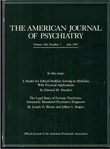Should young children testify in cases of sexual abuse?
Abstract
Children as young as age 3 are testifying in cases of sexual abuse and molestation. Very young children can accurately recall emotionally charged, personally significant events. They demonstrate more errors of omission, difficulties with time and number of concepts, and occasional misinterpretations of others' actions. Children's testimony can be influenced by an overly authoritative or ingratiating attorney stance, an attorney's preconceived notions, age-inappropriate questions, and the child's limited attention span. Children may be helped or harmed by testifying. The risk of further traumatization can be minimized through the judge's use of discretionary power, inclusion of professionals trained in child development in the investigative and court process, and use of videotaping or one-way screens.
Access content
To read the fulltext, please use one of the options below to sign in or purchase access.- Personal login
- Institutional Login
- Sign in via OpenAthens
- Register for access
-
Please login/register if you wish to pair your device and check access availability.
Not a subscriber?
PsychiatryOnline subscription options offer access to the DSM-5 library, books, journals, CME, and patient resources. This all-in-one virtual library provides psychiatrists and mental health professionals with key resources for diagnosis, treatment, research, and professional development.
Need more help? PsychiatryOnline Customer Service may be reached by emailing [email protected] or by calling 800-368-5777 (in the U.S.) or 703-907-7322 (outside the U.S.).



